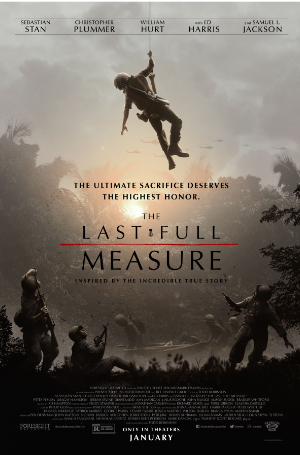
Often we read the passage from the Gospel of John where Jesus tells his disciples at the Last Supper: “No one has greater love than this, to lay down one’s life for one’s friends” (Jn. 15: 13). What does that really mean? Of course, Jesus gives his life for us, after all, he is God. But, can another person really do this for a fellow human being? The Last Full Measure written and directed by Todd Robinson shows that that is possible and does happen, albeit only by extraordinary human beings. Such is the true story of William H. Pitsenbarger, a U.S. Air Force Pararescueman who aided downed soldiers during the Vietnam War. His story is one of heroism to the point of sacrificing oneself to save others. That kind of heroism usually receives the highest award given by the President of the United States through an act of Congress to a military person showing exceptional valor—the rare Medal of Honor. Pitsenbarger (Jeremy Irvine) receives the Air Force Cross posthumously instead of the deserved Medal of Honor. This film looks into the 35-year quest to set the records straight and honor the name of this extraordinary man.
A ladder climbing Pentagon staffer named Scott Huffman (Sebastian Stan) is given the task to investigate the Medal of Honor request presented by Pitsenbarger’s best friend and fellow Pararescueman (PJ for short), Thomas Tully (William Hurt). Tully also works with Pitsenbarger’s parents Frank (Christopher Plummer) and Alice (Diane Ladd) to push this request again into the Pentagon’s consciousness. According to Tully, “justice delayed is justice denied.” Though reluctant in taking on the case, Huffman begins to dig deeper into the reasons for the denied recognition discovering missing chain of command endorsements from the file. He suspects conspiracy.

© 2020 Roadside Attractions. Samuel L. Jackson as Takota and Sebastian Stan as Huffman. All rights reserved.
The story flashes to Pitsenbarger in an Air Force helicopter dropping down in the midst of fierce fighting to rescue the wounded from the battle in Operation Abeliene where the VietCong flatten the 1st Infantry Army Corp to the ground wiping out most of the division. The Operation was one of the worst disasters of the Vietnam War. When Pitsenbarger sees the dire situation on the ground he decides to stay and help his fellow soldiers telling Tully in the helicopter to leave without him, essentially leaving him to die. He saved 60 men from the slaughter before offering himself as a sacrifice. This was the most powerful and emotionally gripping scene of the film and one that made me question whether I would do the same.
Huffman finds some of the men Pitsenbarger saved during Operation Abeliene to capture their testimony, many of whom are too emotionally and psychologically scarred to share much. When Huffman tells former soldier Takoda (Samuel L. Jackson) that surviving isn’t a crime, he responds, “No it ain’t. It’s a life sentence.” In the midst of that battle, he reveals, Pits was the miracle they prayed for. Madison Holt (Dale Dye), the company commanding officer at that time in Vietnam was the creator of Operation Abeliene is now a US Senator and so that information was purposely kept quiet. It became a political problem to award a MOH to someone involved in the failed operation.
The film powerfully expresses the need for veterans to discover hope by keeping the memory alive of those who made the ultimate sacrifice. The veteran who lives in Saigon tells Huffman that he lives there so that when other Vets visit he can offer his butterfly sanctuary as a place where they, “create new memories, happy memories even in a sad place.” It is the exact place where Pitsenbarger came down from the helicopter to rescue them. He says, “The Veterans hold something for all of us. They take the shame of war, denial, and anger and they come here so somebody will listen to them. Medals…bring them together to tell their stories."

© 2020 Roadside Attractions. Jeremy Irvine as William Pitsenbarger. All rights reserved.
Pitsenbarger was a unique soldier among soldiers. He went into the midst of battle to save others. In a letter to his family that he writes before that operation he says, “These things we do that others may live.” Sounds like John 15:13? Not too many people will willingly lay down their life for others, but once in a while there is a human being who embodies that Gospel passage exactly. This story is really about heroism recognized and the importance of telling those stories so that our faith in humanity is not diminished. It truly expresses the power of what one person can do in this world and the value of every human being, even, or especially in the midst of war. We need these stories so we do not forget the gift that is one life!
About the Author

Sr. Nancy is the Director of the Pauline Center for Media Studies and a Media Literacy Education Specialist. She has degrees in Communications Arts and a Masters in Theology and the Arts from Fuller Theological Seminary. She has extensive experience in the creative aspects of social media, print media, radio and video production as well as in marketing, advertising, retail management and administration.
Sr. Nancy has given numerous media mindfulness workshops, presentations and film retreats around the country to youth, young adults, catechists, seminarians, teachers and media professionals helping to create that dialogue between faith and media. She is a member of NAMLE (National Association of Media Literacy Educators), SIGNIS (World Catholic Association for Communicators) and THEOCOM (Theology and Communications in Dialogue) and board member of CIMA (Catholics in Media Associates). She is the author of a theology of popular culture called, A Sacred Look: Becoming Cultural Mystics from Wipf & Stock Publishing. Sr. Nancy is a theologian, national speaker, blogger and film reviewer.